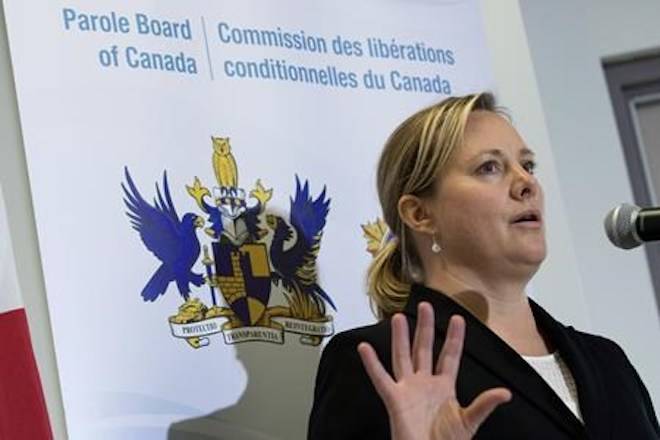Serial rapist and killer Paul Bernardo was swiftly denied parole on Wednesday after a panel heard impassioned pleas from the parents of two of his murder victims to keep him behind bars.
Bernardo, 54, who has spent 25 years in prison and argued he has worked hard to mend his ways, could make another bid for release in two years.
“I’m a very flawed person. I know I’m not perfect,” Bernardo told the panel that spent about 30 minutes deliberating his request for parole. “What I did was so dreadful. I hurt a lot of people. I cry all the time.”
At the same time, Bernardo was adamant he would never reoffend.
“I’m so nice to everybody,” he said. ”Everybody is scared but there is no reason to be scared.”
Bernardo’s crimes over several years in the late 1980s and early 1990s, some of which he videotaped, sparked widespread terror and revulsion.
Among them, Bernardo and his then-wife Karla Homolka kidnapped, tortured and killed Leslie Mahaffy, 14, of Burlington, Ont., in June 1991 at their home in Port Dalhousie, Ont., before dismembering her body, encasing her remains in cement and dumping them in a nearby lake.
Mahaffy’s mother, Debbie Mahaffy, described the unbearable, crushing pain the parole hearing rekindled, saying the “unspeakable and brutally sadistic acts” Bernardo committed were too painful to describe.
“This is an emotional hell for us,” Mahaffy said at the hearing, choking back tears.
Related: Killer-rapist Paul Bernardo set to make parole pitch today
Related: Convicted killer Paul Bernardo faces weapons possession charge
Bernardo, dressed in a blue T-shirt, slouched in his chair and listened with little obvious emotion, although at times he became animated when he spoke and dabbed at his eyes with a hastily proffered tissue while talking about his father.
Dubbed the “Scarborough rapist,” Bernardo also tortured and killed Kristen French, 15, of St. Catharines, Ont., in April 1992 after keeping her captive for three days.
Kristen’s mother, Donna French, argued that Bernardo should never see freedom again.
“How does one describe such immeasurable pain so as to give even the slightest understanding of the overwhelming sadness, the emptiness, and pain we feel even after 26 years of dealing with our loss?” French said.
French also noted that the law was changed after Bernardo’s incarceration to allow for consecutive periods of parole ineligibility.
One of Bernardo’s surviving victims also spoke at the hearing, describing how she was walking home on an evening in May 1988 when he attacked her from behind, dragged her into some bushes and raped her. The result has been emotional devastation from which she has never recovered, she said.
“After the assault, I really became a shell of a person,” she said. “He should never be considered for any freedom for the rest of his life.”
While his parole officer said Bernardo had made minimal gains during his time behind bars, the lifer portrayed himself as someone whose self-esteem was damaged as a child by a speech impediment. He felt increasingly inadequate, he said, adding he was afraid to interact with people. Social anxiety, he said, became sexual — he fretted constantly about being unable to perform.
“The more insecure I felt, the more I tried to control,” he said. “My self-esteem would get better that way.”
Bernardo, who admitted raping 14 other women, was also convicted of manslaughter in the December 1990 death of Homolka’s younger sister, Tammy. The 15-year-old girl died after the pair drugged and sexually assaulted her. Homolka later said she wanted Bernardo to have Tammy’s virginity as a Christmas present.
Bernardo said he was completely shattered by Tammy’s death, which only exacerbated his low self-esteem and led to his increasingly savage attacks on women and girls.
“I hurt a lot of people,” he said. “I absolutely did and this is why I cry.”
“Would you say you used women as objects?” Suzanne Poirier, one of the two Parole Board of Canada members hearing the case, asked him at one point.
“Back then, absolutely,” he responded.
“How has this changed?” Poirier inquired.
“I over-used sex and that led to those cognitive distortions,” Bernardo said.” I overly based my self-esteem on sex.”
Bernardo denied that he’s a sadistic psychopath, although he admitted he felt nothing for his victims at the time he committed his crimes. It was all a matter of asserting power and control in an effort to give his fragile ego a boost, he said.
Poirier said Bernardo’s empathy seemed to be recent.
Parole officer Meagan Smith said Bernardo had “low integration potential.” Though low risk for violence in general, his risk increases when it comes to intimate partners, she said.
His lawyer, Fergus (Chip) O’Connor, said Bernardo has aged into a low-risk demographic when it comes to sexual offences. While the perspective of victims must be heard, he said their views could not be determinative.
Bernardo’s parents, whom he described as wonderful and supportive through his childhood, visit him in prison and have offered support if he is released, O’Connor said. They did not attend the hearing.
Colin Perkel , The Canadian Press
Like us on Facebook and follow us on Twitter.



